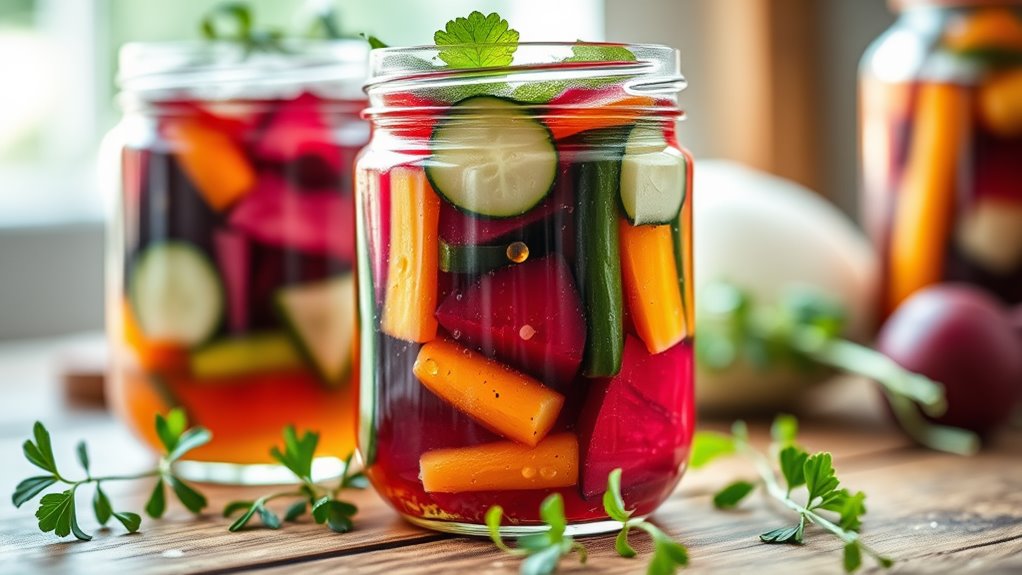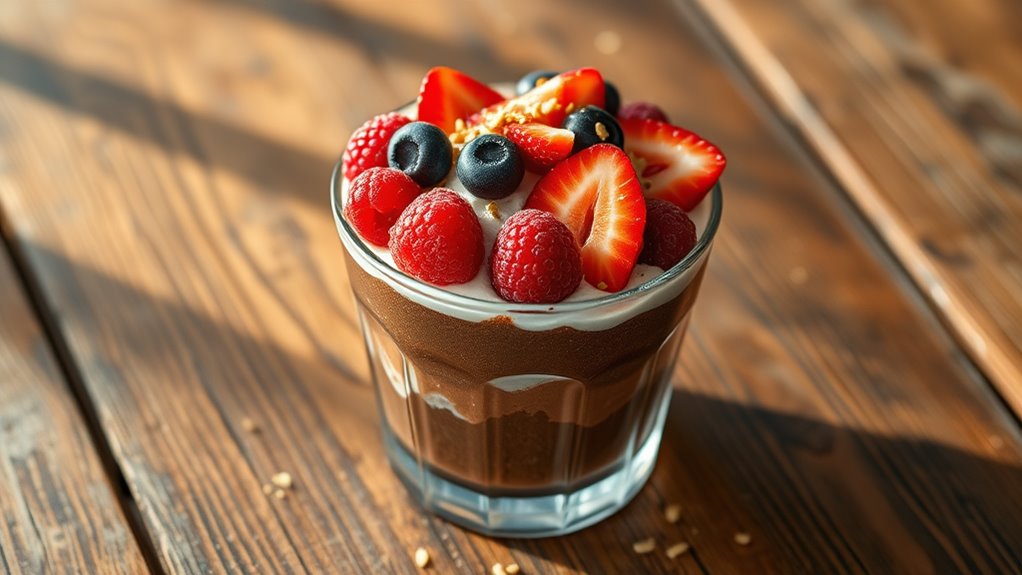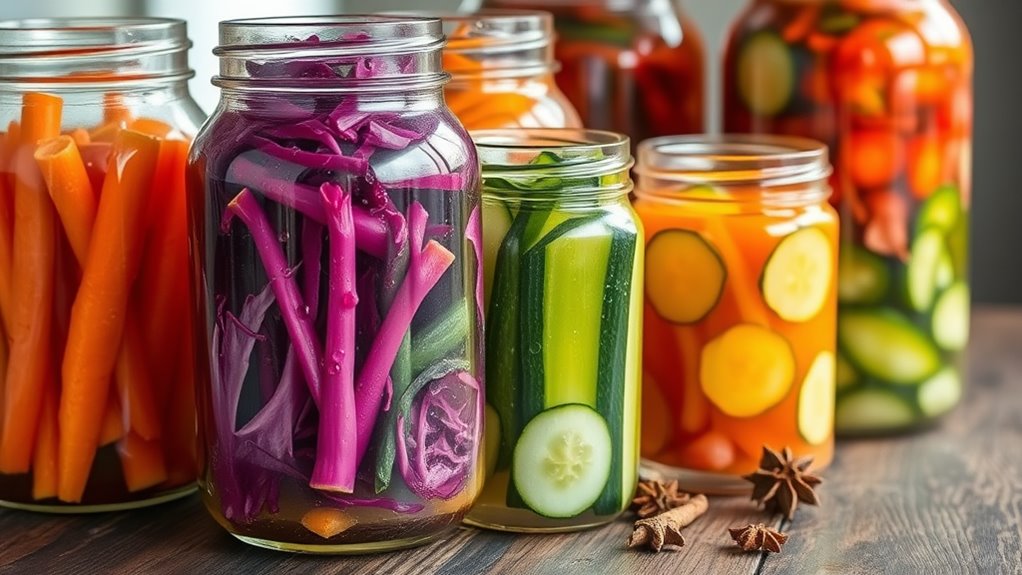This Fermented Food Recipe Supports Gut Health Daily
Many people believe that fermented foods can significantly improve gut health, but what does the science say? Research suggests that these foods, rich in probiotics, can enhance your microbiome balance and digestion. However, the effectiveness can vary based on individual dietary needs and preferences. Understanding how to incorporate these foods into your routine could make a noticeable difference in your overall wellness. Are you ready to explore the benefits and process of making your own?
Key Takeaways
- Incorporate fermented foods like yogurt, kefir, and kimchi into your daily diet for a probiotic boost that supports gut health.
- Use fresh vegetables and whole grains in your recipes to enhance nutrient content and promote fiber intake.
- Follow proper fermentation practices at home to create safe and effective probiotic-rich foods.
- Store fermented foods in cool, dark places to maintain their freshness and extend shelf life.
- Gradually introduce these foods into your diet, starting with small portions to allow your gut to adapt.
Understanding Gut Health and Its Importance
Gut health plays a crucial role in your overall well-being, impacting everything from digestion to immune function.
A balanced gut microbiome is essential for nutrient absorption, mental health, and inflammation regulation.
Incorporating fermented food for gut health, like yogurt, kefir, and sauerkraut, introduces beneficial probiotics that can enhance microbial diversity.
These foods help maintain a healthy gut lining and support your immune system.
By consuming a variety of fermented options, you can actively nurture your gut flora, leading to improved overall health.
Prioritizing gut health isn’t just about what you eat; it’s about optimizing your body’s intricate ecosystem for longevity and vitality.
Additionally, regularly consuming fermented drinks can further promote gut health and enhance your energy levels.
Benefits of Fermented Foods for Digestion
Fermented foods act as probiotic powerhouses, supporting the growth of beneficial gut bacteria. This improved microbial balance not only aids digestion but also enhances nutrient absorption, ensuring your body gets the maximum benefits from the foods you eat. Incorporating these foods into your diet can significantly boost your digestive health. Additionally, many fermented foods are rich in nutrient absorption and can help regulate your digestive system effectively.
Probiotic Powerhouses
Probiotic-rich foods offer a powerful boost for your digestive health, acting as a natural ally in maintaining a balanced gut microbiome. These foods, packed with live bacteria, can enhance digestion and reduce bloating while promoting regularity. Incorporating them into your diet could lead to a happier gut.
| Food | Probiotic Strain |
|---|---|
| Yogurt | Lactobacillus |
| Sauerkraut | Leuconostoc |
| Kimchi | Lactobacillus plantarum |
| Kefir | Lactobacillus kefiri |
| Miso | Aspergillus oryzae |
Adding these probiotic powerhouses can significantly improve your digestive well-being.
Enhanced Nutrient Absorption
Incorporating fermented foods into your diet can significantly enhance nutrient absorption, making the most of the vitamins and minerals your meals provide.
Fermented foods, rich in probiotics, help break down complex nutrients into more bioavailable forms, allowing your body to absorb them more efficiently.
For instance, the fermentation process can increase the levels of B vitamins and enhance the bioavailability of minerals like iron and zinc.
This means you’re not just consuming nutrients; you’re maximizing their benefits.
Key Ingredients for the Fermented Recipe
When creating a fermented food recipe, selecting the right ingredients is crucial for achieving optimal gut health.
Start with fresh vegetables, like cabbage or carrots, which provide essential nutrients and serve as a substrate for fermentation.
Incorporating whole grains, such as brown rice or quinoa, can enhance fiber content, promoting digestive health.
Ensure you include a quality starter culture, like kefir grains or probiotic-rich yogurt, to introduce beneficial bacteria.
Don’t forget seasoning with herbs and spices, like garlic or ginger, which add flavor and may offer additional health benefits.
These ingredients work together to support a balanced gut microbiome. Additionally, including delicious fermented recipes can help diversify the beneficial bacteria in your diet.
Step-by-Step Instructions for Making the Recipe
Now that you’ve gathered your key ingredients, it’s time to put them to work.
Start by thoroughly washing your hands and sterilizing your equipment to prevent unwanted bacteria.
Next, chop your vegetables and place them in a large mixing bowl.
Add your salt and any spices, mixing well to ensure even distribution.
Pack the mixture tightly into a clean jar, leaving some space at the top.
Pour in water until the vegetables are submerged.
Seal the jar loosely to allow gases to escape during fermentation.
Store it in a cool, dark place for several days, checking daily for bubbles and aroma. Remember, proper fermentation techniques are essential for achieving the best flavor and health benefits.
Tips for Storing and Serving Your Fermented Food
To maximize the benefits of your fermented foods, it’s crucial to store them under ideal conditions.
Consider factors like temperature and light exposure to maintain their probiotic content and flavor.
Additionally, understanding shelf life and serving suggestions can enhance your enjoyment and health outcomes. Incorporating simple fermented recipes into your diet can also provide a variety of flavors and textures, making gut health more enjoyable.
Ideal Storage Conditions
Proper storage conditions are crucial for maintaining the quality and health benefits of your fermented foods.
Store your fermented products in a cool, dark place, ideally between 32°F and 50°F. Use airtight containers to prevent exposure to oxygen, which can spoil your food.
If you’ve made a large batch, consider dividing it into smaller portions for easier access and to limit exposure when opened.
Always check for signs of spoilage, such as off smells or mold.
Lastly, remember to label your containers with dates to track freshness and ensure you’re consuming them at their peak health benefits.
Serving Suggestions
When it comes to serving your fermented foods, presentation and pairing can significantly enhance your dining experience. Consider serving fermented vegetables in a colorful bowl to highlight their vibrant hues. Pair them with whole grains or proteins to create a balanced meal.
You can also incorporate your fermented foods into salads or sandwiches for added flavor and probiotics. Remember to keep portions manageable, as the tangy taste can be intense.
For dips or spreads, serve with fresh vegetables or whole-grain crackers. Experiment with flavors, and don’t hesitate to share your creations with friends for a communal dining experience.
Shelf Life Tips
Storing fermented foods correctly can significantly extend their shelf life while preserving their flavor and probiotic benefits.
Keep your fermented items in airtight containers to minimize exposure to air, which can lead to spoilage.
Refrigeration is key; most fermented foods last several weeks when stored at 32°F to 40°F.
For long-term storage, consider freezing small portions—though this may alter the texture, the health benefits remain intact.
Always check for signs of spoilage, such as off-smells or mold.
Finally, serve portions directly from the container to maintain the integrity of the remaining food. Enjoy your gut-healthy treats with confidence!
Incorporating Fermented Foods Into Your Daily Diet
How can you effortlessly incorporate fermented foods into your daily diet?
Start by adding a dollop of yogurt to your breakfast or smoothie; it’s a simple way to boost gut health.
Swap out regular bread for sourdough, which contains beneficial bacteria.
Include a side of kimchi or sauerkraut with lunch or dinner to enhance flavor while promoting digestion.
Consider snacking on kefir or kombucha for a refreshing probiotic boost.
Gradually introducing these foods will help your gut adapt and thrive. Additionally, making your own fermented foods at home can be a fun and rewarding experience, as it allows you to explore the joy of DIY fermentation while boosting your health.
Personalizing Your Fermented Recipe for Maximum Flavor
Personalizing your fermented recipe not only enhances flavor but also allows you to tailor the health benefits to your preferences. You can experiment with various ingredients to create a unique taste profile while maximizing the probiotics your gut loves. Here’s a quick guide to help you customize your fermentation:
| Ingredient Type | Flavor Profile |
|---|---|
| Vegetables | Crunchy, savory |
| Herbs & Spices | Aromatic, zesty |
| Fruits | Sweet, tangy |
| Sweeteners | Rich, caramel-like |
| Liquids | Smooth, tangy |
Feel free to mix and match for your ideal fermented creation! Incorporating fermented drinks into your routine can also enhance your overall well-being by providing numerous health benefits.





